Classical Music CD Reviews: ROCO’s “Visions Take Flight,” Nordic Affect’s “He(a)r,” and “John Cage: Guitar.”
By Jonathan Blumhofer
Visions Take Flight is one of those rarest of accomplishments: a contemporary music album that’s a sheer joy to listen to, from start to finish. Nordic Affect’s concept album manages to make and leave a strong emotional impact. And John Cage on guitar? Why not?

If you needed proof that the stylistic wars of the 1940s through, roughly, the ‘80s are things of the past, look no further than the River Oaks Chamber Orchestra’s (ROCO) Visions Take Flight. The ensemble’s debut album simply couldn’t have happened thirty-five years ago. It features six pieces by five composers that are beholden to no single compositional language. Quite the contrary: several pieces seem to gleefully dabble in strongly contrasting techniques.
Most, in fact, tend towards diatonicism, and that’s no problem. Actually, it’s perhaps this two-disc set’s most compelling quality, a reminder that the tradition of writing urgent, non-derivative, essentially tonal music is very much alive and well, if you just know where to look for it.
So is the old compositional habit of finding creative stimulation in non-musical and multi-cultural sources.
Karim Al-Zand’s Visions from Another World, for instance, draws on engravings by the 19th-century artist J. J. Grandville. It’s a marvelously fresh piece that’s both seriously put together and seriously fun. Al-Zand’s writing seem to channel the ghosts of Ravel and Ibert a bit here and their (or maybe their cousins), and that’s all for the good: the opening “Ronde Fantastique” is spunky and whimsical, “Funeral Cortege of a Silkworm” broods strangely but solemnly, and the concluding “The Spinning Ballerina” whorls with brilliance.
Teen Murti heads after another direction, drawing on composer Reena Esmail’s Indian heritage and interest in Hindustani music. Alternating three principal ideas, it’s a score that mixes moments shimmering beauty and potent athleticism with grace and intelligence.
Some of Teen Murti’s gestures – wispy, stratospheric violin cantillations, in particular – also appear in Derek Bermel’s Murmurations. Inspired by the connections Bermel draws between flocks of birds in flight and the interactions of members of a string orchestra, its three movements run from the cerebral (“Gathering near Gretna Green”) to the serenely expressive (the central “Soaring over Algiers”) to the chill (the concluding “Swarming Rome”).
Anthony DiLorenzo’s Jabberwocky sets Lewis Carroll, a couple of ways: first, via an instrumental interpretation; then, verbally, ending with a recitation of the title poem over a lush orchestral accompaniment. Much of DiLorenzo’s writing in Jabberwocky is cinematic: tuneful, evocative of Wonderland-like scenes, full of striking gestures and colors. Less original but still stirring is Anthem of Hope: Houston Strong, DiLorenzo’s post-Hurricane Harvey score that channels Copland and John Williams in about equal measure.
Like Jabberwocky, Marcus Maroney’s Concerto for Chamber Orchestra is quite engaging. Its allusions to Sibelius and Bartók never get in the way of (or unduly weigh down) Maroney’s ingratiating and idiomatic writing for the ensemble.
All of the performances, led with elegant command by Mei-Ann Chen, may as well be considered definitive. ROCO plays with terrific technical command, certainly, but also with a real sense of style and abandon. Just listen to the blazing colors of the Al-Zand, or the biting rhythms of Teen Murti, or the manic glee that marks parts of Jabberwocky and try not to get drawn in.
Actually, don’t do that. Just give in. After all, Visions Take Flight is one of those rarest of accomplishments: a contemporary music album that’s a sheer joy to listen to, from start to finish. Those come along, well, pretty rarely.

Sound and hearing, particularly the practice of “deep listening” as espoused and taught by Pauline Oliveros, is at the heart of Nordic Affect’s latest release, He(a)r. Juxtaposing readings from Angela Rawlings, Roni Horn, and Oliveros with music by five leading Icelandic composers, it’s a concept album that manages, despite its sometimes-esoteric quality, to make and leave a strong emotional impact.
Maria Huld Markan Sigfúsdóttir’s Spirals is the album’s first piece. It features a series of slowly unfolding lines that often overlap, sometimes functioning melodically, sometimes harmonically, but constantly interspersed with gentle percussion riffs and electronically-generated sounds.
Mirjam Tally’s warm life at the foot of the iceberg offers a violent contrast. String extended techniques evoke sawing and disintegration; a harpsichord contributes explosive gestures; rhythmic tattoos and wild glissandos alternate with fragments of melodic ideas. It’s a piece constantly in flux, always a bit (at least) unsettled.
Then come Anna Thorvaldsdottir’s two contributions, Reflections and Impressions. The former, with its gently shifting textures is basically a fragile meditation that, as the piece progresses, seems to run aground and splinter. In the latter, Thorvaldsdottir draws a wild array of sounds from a prepared harpsichord, sometimes hypnotic, sometimes terrifying.
Hildur Gudnadottir’s Point of Departure picks up the pieces, as it were, employing an instrumental ensemble – violin, viola, cello, and harpsichord – and the voices of the players to form a kind of meta-instrument. The expressive results are beguiling.
So is the disc’s closing track, Maria Huld Markan Sigfúsdóttir’s Loom. An often lush, slowly-unfolding work, it’s filled with music and sonorities of great beauty, the impression of which stays with you long after the track – and album – has ended.
The performances, by Nordic Affect, are potent: even the most abstract gesture you’ll find among these pieces conveys vital purpose.

John Cage on guitar? Why not? Though the American maverick never wrote explicitly for the instrument, some of his early piano music was adaptable enough for guitarist Aaron Larget-Caplan to arrange for his instrument. The results, out now John Cage: Guitar, are often enticing and plenty appealing.
Larget-Caplan’s program consists of seven Cage pieces, all of which originated in the 1930s and ‘40s, a couple of which are remarkably prescient. The opener, A Room, for instance, anticipates the Minimalist procedures of a later generation or two. And the prepared-guitar closer, Bacchanale, sounds a couple decades younger than it is, almost like a kind of high-brow anticipation of Jimi Hendrix.
In between come Cage’s Three Easy Pieces, which sound like just that: a set of short, contrapuntal exercises that exude not a little bit of charm, especially the central “Duo.” Chess Pieces and Dream are more substantial. The former is adapted from a composition that appears in a 1944 Cage painting while the latter, a ruminative essay, was originally conceived as a dance piece. In a Landscape is another affecting, resonant meditation.
Then there are Six Pieces, a set of radiant miniatures for violin and guitar, in which Larget-Caplan’s joined by violinist Sharon Leventhal. Cage’s writing here is highly specific – the violin part, for instance, indicates which string each note is supposed to be played on – but the music itself is anything but restrained, ranging from the quiet ecstasy of “Melody 1” to the jaunty syncopations of “Melody 3” and the subdued glow of “Melody 6.”
Larget-Caplan’s performances are excellent. Technically, he’s got everything under control, no matter how involved the arrangements get. What’s more, his playing brims with charisma and understanding: Cage can be a tough composer to really bring to life. Larget-Caplan (and Leventhal, in Six Pieces) manage the feat impressively.
Jonathan Blumhofer is a composer and violist who has been active in the greater Boston area since 2004. His music has received numerous awards and been performed by various ensembles, including the American Composers Orchestra, Kiev Philharmonic, Camerata Chicago, Xanthos Ensemble, and Juventas New Music Group. Since receiving his doctorate from Boston University in 2010, Jon has taught at Clark University, Worcester Polytechnic Institute, and online for the University of Phoenix, in addition to writing music criticism for the Worcester Telegram & Gazette.
Tagged: Aaron Larget-Caplan, He(a)r, Innova, Nordic Affect, ROCO, River Oaks Chamber Orchestra, Sono Luminus, Stone Records, and John Cage: Guitar
